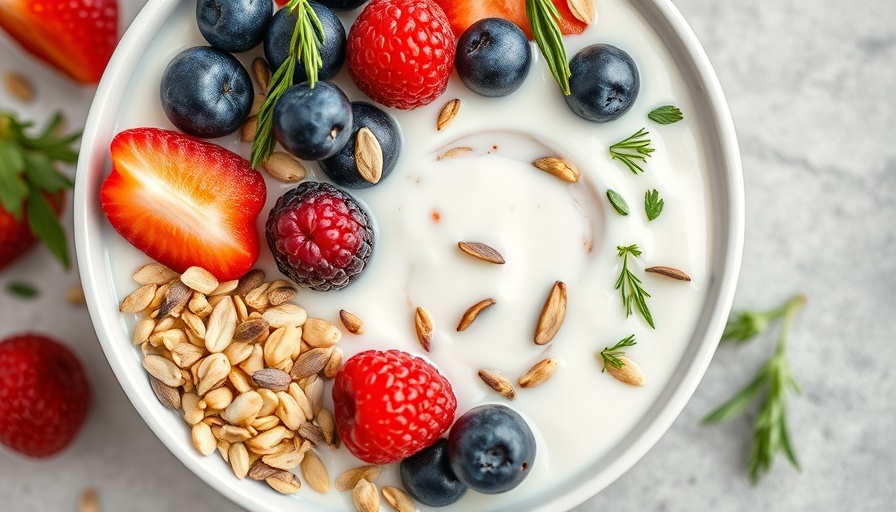
The Breakfast Myth: Is Low-Fat Really Healthy?
What if the breakfast you’ve trusted for years is secretly harming your heart? For many seniors, diet choices such as low-fat yogurt and cereal labeled as heart-healthy could be a deceptive trap. Recent insights reveal the possibility that these once-believed healthy options may, in fact, contribute to inflammation, blood sugar spikes, and deterioration of cardiovascular health.
In 'This Low-Fat Breakfast Could Be Hurting Your Heart,' the discussion dives into the unexpected consequences of seemingly healthy breakfast choices for seniors, prompting us to explore alternative, heart-friendly nutrition options.
The Role of Blood Sugar in Heart Health
Dr. Evelyn Hart emphasizes that after age 60, the body begins to react differently to foods, especially low-fat products. Removing fat often leads manufacturers to replace it with sugars or refined carbohydrates that can cause rapid spikes in blood sugar levels. For instance, a recent study published in JAMAMA Internal Medicine showcased that a 10% increase in intake of refined carbs correlated with a substantial 13% decrease in healthy aging markers, such as improved blood pressure and cholesterol levels. This means that opting for low-fat breakfast items might inadvertently lead to more health problems down the road.
Start Your Day Off Right: A Shift Towards Whole Foods
Consider the story of Roger, a 72-year-old who always started his day with a bowl of light cereal. By mid-morning, he would feel drained and ravenous, mistakenly believing this was normal aging. Once he switched to steel cut oats with walnuts and cinnamon, his energy levels stabilized. Foods rich in healthy fats and fiber can help regulate blood sugar levels and keep you feeling full longer. Making a simple swap, such as opting for steel cut oats, can have profound effects on your health.
Inflammaging: Understanding the Silent Threat
Chronic inflammation, dubbed 'inflammaging,' discreetly builds within our body as it ages. Many breakfast items that appear healthy are often high in sugar, which exacerbates this silent condition. For example, a study from the University of Bologna found that older adults consuming high glycemic breakfasts had 48% higher inflammatory markers—indicative of increased risks for heart disease. On the flip side, foods that reduce inflammation can stabilize your health. Mary, a 69-year-old woman who transformed her breakfast through Dr. Hart's guidance introduced plain Greek yogurt with chia seeds and blueberries, which led to improved clarity and reduced discomfort from inflammation.
The Gut-Heart Connection
Your gut health plays a pivotal role in maintaining heart health. Recent studies show that beneficial gut bacteria help digest food, control inflammation, and even produce cardiac-protective compounds. However, low-fiber and high-carb diets—common in traditional breakfast foods—can negatively affect this balance. Through diet adjustments that incorporate prebiotic fiber, such as apples and kefir, seniors can restore gut health and see marked improvements in their overall wellness.
Timing Your Morning Coffee for Optimal Health
Most of us love our morning coffee, but timing is key. Drinking coffee immediately after waking can spike arterial stiffness due to the cortisol surge. By allowing your body to adjust, you can enjoy your coffee without hindering heart function, as seen in studies highlighting a 17% increase in arterial stiffness when coffee was consumed within 15 minutes of waking. Instead, start your day with a warm glass of lemon water before having your beloved brew.
Adjusting Your Long-Held Beliefs About Fats
Many have been conditioned to block fats, believing they’re the primary culprits behind heart disease. However, research indicates that the real villain may be sugar replacing those fats in diets. Individuals like Anna, who originally avoided fats at her doctor’s advice, found that incorporating healthy fats stabilized her energy levels, mitigated hunger swings, and improved cholesterol scores. Rather than eliminating fats, understanding and embracing them as part of a balanced diet can enhance heart health.
Your Takeaway: Start Nourishing, Not Starving
Understanding the messages your breakfast sends can empower you to make better choices. As you reassess your morning routine, consider foods that promote health rather than those that merely fill you up. Starting tomorrow, integrate healthy fats and whole foods into your breakfast for a heart-friendly meal that nourishes your body.
If you found these insights enlightening, share this article with someone who’s still following outdated dietary rules that don’t serve their health. Together, let’s promote better breakfast choices for a more vibrant and heart-healthy future.
 Add Element
Add Element  Add Row
Add Row 



Write A Comment